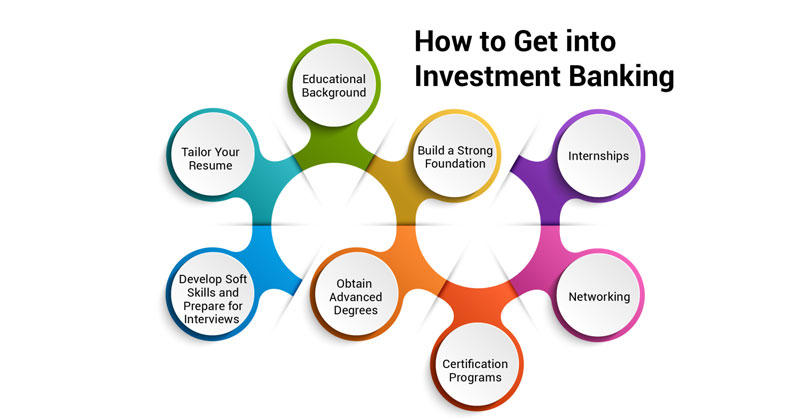Capturing the attention of ambitious minds like yours, investment banking stands as an intriguing pathway to a sophisticated white-collar profession. A career in investment banking is often synonymous with entering a lucrative field where entry-level positions swiftly translate into six-figure salaries.
Beyond the allure of financial growth, it demands finesse in navigating the intricate world of wealth creation. Simply put, it's about breathing life into businesses, fostering growth, and strategically maneuvering through the dynamic landscape of finance. The question that echoes is, how does one enter this realm? How does one become an investment banker?
Read along to learn everything about getting into the world of investment banking!
How to Know if Investment Banking Career is Right for You?
Before immersing yourself in this article, pause and consider two fundamental questions:
-
Is this career right for you, and do you have a viable path to enter?
- If you're an undergraduate, especially at a prestigious university, it's advisable to contemplate investment banking early due to the rapid recruitment process.
- If you attend a target school, breaking into the industry may be more accessible, but thorough preparation remains crucial.
- However, if you are not studying at a top university, you should weigh the effort required to break into investment banking against other potential career options.
To get into this field, you must be passionate about advising on transactions or targeting specific exit opportunities like private equity. Here's how you can be sure if Investment Banking is right for you:
- Carefully evaluate whether investment banking aligns with your career goals and interests. If you're not at a top university and not planning to attend a top MBA program, breaking into the industry may be challenging. Consider whether the effort is justified, especially when alternative finance roles may be attainable with less struggle.
- If you're genuinely passionate about deals or targeting an exit opportunity requiring investment banking experience, the commitment may be worthwhile. Otherwise, it might be more beneficial to explore other pursuits.
Understanding Investment Banking
Now that you have determined to have your investment banking career path, let’s understand its landscape.
The core function of investment banking lies in delivering comprehensive financial advisory services to a varied clientele, which spans corporations, governmental bodies, and institutions. At the heart of this integral role is facilitating diverse financial transactions, including but not limited to mergers, the underwriting of securities, and the meticulous oversight of Initial Public Offerings (IPOs). Investment bankers act as financial guides, supporting clients through intricate financial transactions. These professionals possess diverse skills, managing tasks from securing loans to navigating stock and bond issuance. They play a pivotal role in setting securities prices, facilitating mergers, and offering investment counsel.
How to Get into Investment Banking
Here's an overview of the key steps for how to become an investment banker—

-
Educational Background
Begin by choosing a relevant degree. While it's not mandatory, many successful investment bankers have degrees in finance, economics, business, or related fields. You should also look into universities with business programs.
-
Build a Strong Foundation
Develop your technical skills, like financial modeling, valuation, and data analysis. Get familiar with financial statements, accounting principles, and essential software like Microsoft Excel. Stay updated on industry trends and economic conditions by reading financial news and reports.
-
Internships
Gaining hands-on experience through internships in finance-related roles, such as corporate finance, asset management, or investment management, is crucial. Regardless of your academic qualifications, relevant experience in roles like corporate finance or investment management is vital. It shows your commitment to the field.
-
Networking
Networking is key. Use internships to connect with people in the industry. You must attend industry events, join finance-related clubs, and make use of platforms like LinkedIn for networking. Building professional relationships can lead to internships, mentorship, and job opportunities. Conduct informational interviews to learn more about the industry. Keep in mind that it's not just about what you know; it's also about who you know.
-
Certification Programs
Consider certification programs like the Chartered Investment Banking Professional (CIBP™) for in-depth training. This globally acknowledged program by IBCA provides a broad perspective, giving you a competitive edge. Certification programs benefit not only newcomers but also industry professionals, by providing a competitive edge. This also increases the potential for higher salaries and makes room for promotion.
-
Obtain Advanced Degrees (if necessary)
If getting into investment banking directly is tough due to its highly competitive landscape, consider pursuing an MBA from a reputable business school. This will enhance your credentials and will equip you for an investment banking career. An MBA with a robust financial curriculum will provide you a competitive edge over bachelor's degree holders with similar experience in job searches.
-
Develop Soft Skills and Prepare for Interviews
Soft skills are of grave importance in investment banking. Thes skills are vital for effective communication, teamwork, and client relations, enhancing overall professional effectiveness. Investment bankers need to explain complex concepts clearly; so, work on your communication and presentation skills. And continue to practice answering technical questions related to financial modeling, valuation, and market trends to excel in interviews.
-
Tailor Your Resume
Your resume is your first impression, and you wouldn’t want to mess that up. When applying for roles like Investment Banking Analyst or Associate, tailor your resume for each position— quantify your achievements emphasizing your contributions and impact. Investment banks receive countless resumes, so it's crucial to ensure yours stands out.
Be aware of the industry's competitiveness. Stay persistent, be open to feedback, and keep refining your approach. Breaking into investment banking requires determination and continuous improvement.
How to Advance Your Career in Investment Banking?
To advance in investment banking, immerse yourself in employer-supported training and certifications. It's not just about skill enhancement; it's about staying sharp and competitive. Envision it as a journey where you gain fresh knowledge, keep up with industry trends, and connect with influential figures through a strong professional network. Actively seeking chances to broaden your expertise isn't just about education; it's about gaining hands-on experience in corporate finance and investment. This proactive approach sets you up for a step up into higher management roles in the vibrant and competitive world of investment banking. Picture it like a continuous learning adventure with strategic networking – key ingredients for a successful and ever-growing career in this dynamic field.
What’s Next?
Following the steps outlined in this article will greatly enhance your preparation for investment banking recruiting, placing you ahead of most candidates. However, it's crucial to understand the pathways into the investment banking industry.
Recognize that there are common pathways into investment banking, such as through top universities, MBA programs, or lateral hires from relevant fields. Avoid the misconception that your case is unique, and there's a different, easier path. The reality is that many individuals fall into well-defined categories, and it's essential to know where you stand.
Be realistic about your circumstances and whether you have a viable shot at breaking into investment banking. Acknowledging this reality early on will help you navigate the right strategies for your specific situation.

